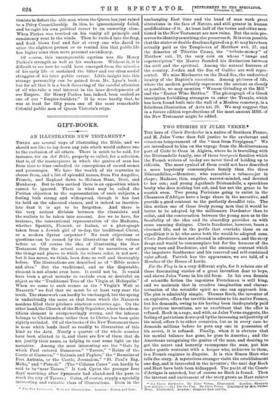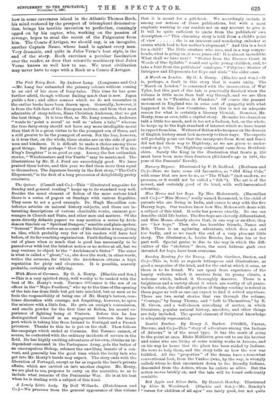TWO STORIES BY JULES VERNE.*
THE hero of Clovis Dardentor is a native of Southern France, and M. Jules Verne does full justice to the exuberant and vivacious temperament of the "man from Perpignan." We are introduced to him on the voyage from the Mediterranean port of Cede to Oran in Algiers, where he is travelling with the Desirandelle family, one of those bourgeois families which the French writers of to-day are never tired of holding up to ridicule. The most cynical of them could not have described a more hopelessly commonplace family than the three D6sirandelles,—Monsieur, who resembles a tobacco-jar in shape ; Madame, thin, angular, narrow-minded, and devoted to her son ; and young Agathocle Desirandelle, a speechless booby who does nothing but eat, and has not the grace to be seasick even. Two young Parisians going to enlist in the Chasseurs d'Afrique have a large share in the narrative, and provide a good contrast to the perfectly dreadful trio. The idea strikes one of these lively young men that it would be better to be adopted by the millionaire Dardentor than to enlist, and the conversation between the young men as to the feasibility of the idea and its absurdity provides us with some amusing dialogue. Clovis Dardentor, however, bears a charmed life, and in the perils that overtake them on an expedition it is he who saves both the would-be adopted sons. Clovis Dardentor does not abound in adventures, and the story drags and would be commonplace but for the humour of the young men and Dardentor, and the amusing contrast which the impulsive Southerner and his reserved and self-contained valet afford. Patrick has the appearance, we are told, of a Member of the House of Lords.
For the Flag is in a very different style, for it relates one of those fascinating stories of a great invention dear to boys, and shows Jules Verne in his old form. In his own domain of scientific fiction the ingenious Frenchman is still king, and we maintain that in creative imagination and charac- terisation of the scientific spirit no one can approach him. The plot is admirably simple. Thomas Roch, the inventor of an explosive, offers the terrible invention to his native France, but his demands, owing to his having been inadequately paid for previous inventions, are so exorbitant that the offer is refused. Roch in a rage, and with, as Jules Verne suggests, the feeling of patriotism destroyed by the increasing subjectivity of his mind, offers it to other countries, but as in every case he demands millions before he puts any one in possession of his secret, it is refused. Finally, when it is obvious that his mental balance has gone, he goes to America ; and the Americans recognising the genius of the man, and desiring to get the secret and honestly recompense the man, put him under gentle restraint with a keeper who, unknown to them, is a French engineer in disguise. It is this Simon Hart who tells the story. A mysterious stranger -visits the establishment one day, and is interested in the inventor ; the next day Rock and Hart have both been kidnapped. The yacht of the Comte d'Artigas is searched, but of course no Roch is found. Then the interest and excitement of the story grows as Hart relates • (1.) Clovis Dardentor. By Jules Verne. Illustrated. London : Sampson Low and Co.—(2.) For the Flag. By Jules Verne. Translated by Mrs. Cashel Hoey. Illustrated. London; Sampson Low and Co. how in some cavernous island in the Atlantic Thomas Roch, his mind restored by the prospect of triumphant demonstra- tion, brings his terrible invention to perfection, cunningly egged on by his captor, who, working on the passion of revenge, hopes to steal the secret of the Falgurator from him. The Comte d'Artigas, we should say, is an incognito, another Captain Nemo, whose hand is against every man. Very dramatic, and quite in Jules Verne's best style, is the end of the story. Roch exercises a peculiar fascination over the reader, as does that scientific machinery that Jules Verne knows so well how to use. We trust civilisation may never have to cope with a Roch or a Comte d'Artigas.























































 Previous page
Previous page